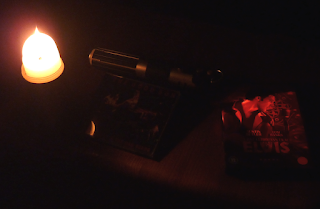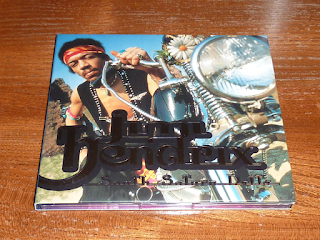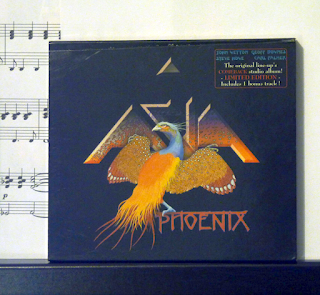Broadly speaking, there are three areas in which the Escapade material needs improving. These are the production, the lyrics, and the way the material is framed.
Production
Since the release of the Escapades, several people have cited Frank Zappa's Synclavier experiments of the 1980s as an example of the computer-music approach "done right". Consequently, in preparation for this project I decided to familiarize myself with some of this stuff.
 |
Actually not as misleading an album title as some have insinuated, I think.
|
I think the difference lies in Zappa's artistic aims (even at his most purely musical) being significantly different from mine. The atmosphere the Synclavier creates is an eerie one, and Zappa tends to lean into that. The unsettling mental picture I get is of a computer engaging in some sort of Satanic ritual. Certainly none of the programmed music remotely aims for the kind of rarefied beauty so much of my work goes for: the track that does, "St. Etienne", doesn't feature the Synclavier at all, and is instead edited down from a surprisingly moving live rendition of "Drowning Witch". It's lovely, and the effect of the preceding "Damp Ankles" segueing into it is almost cathartic.
The obvious conclusion is that while the computer-music production approach isn't inherently a bad one, it is a poor fit for me. Fortunately, other developments in recent years have made it so that I can't pretend that I need to make music that way anymore. The huge game-changer is the fact that it's now possible to work with other musicians remotely, meaning that the high quotient of classical specialization among my immediate acquaintances is no longer a barrier. Moreover, it's already become clear that my grounding in classical is eminently transferrable, as several of the artists I've worked with on other projects have warmly complimented the clarity of my notation.
So this time, there will be a healthy dose of real guitars, real basses, and real drums! I shall be playing piano and synthesizer. There'll probably still be some programming, too, but only for parts where that's actually the right choice. (Some string parts in "Faraway Island" come to mind.)
I'll probably be handling about half the vocals. I basically have the same range as Mark Knopfler, so it's not like my voice is unworkable for this material, but I do have a plaintive intensity in my higher registers that probably isn't the best fit for a lot of it. And more generally, I've known for years that my voice is more naturally a soul voice than a rock one.
To the surprise of some I don't use anything more sophisticated than Audacity for mixing these days. While this free program used to be a bit of a joke, it's evolved over the years into something quite respectable. It doesn't offer a lot of post-production gimmicks, but I've never been wild about such things anyway. Moreover, by forcing myself to do things the hard way, I greatly reduce the risk of falling into the mixing complacency that so crippled Escapade 2. Finally, my background in classical (in which a rigid tempo is rarely desirable) means that thinking in seconds, rather than in beats, at the mixing stage feels normal to me.
Lyrics
The lyrics will be re-worked much more ruthlessly here than on Escapade 2, where (notwithstanding "Look and See") I only ironed out some of the more flagrant verbal creases. It's been so long since I originally wrote this material, that my thoughts and feelings on what I'm writing about have become far more nuanced. This different perspective may well make it easier to come up with enough verses to fill the songs without having to repeat anything: I feel this could improve "Faraway Island" in particular.
"Modern Art" will be instrumental this time, probably with the melody on nylon-string acoustic guitar or something. While the author of the text did give me his permission to turn it into a song all those years ago, I feel guilty that some of the mockery that met the Escapade version spilled over onto the actual poem, too. I just don't want to fan those flames again.
Presentation
As Escapade 2 made painfully clear, the original running order bogs the album down. Setting the scene is all very well, but only one song is needed to do that. Since most of "March for the Age" is going to be cut, I no longer have the option of using that slab of electronic bombast to open the proceedings. And "My Next Escape" isn't really opener material without it.
Therefore, instead I'll be opening with "Days to Midnight". It's fast, it's catchy, and in the context of this project it has the advantage of being a song that requires (relatively speaking) little attention besides lyrics.
On both extant Escapades, "Days to Midnight" is followed by "Modern Art". I, however, have always seen "Modern Art" as middle-of-album material more than anything, so that won't do this time. I think a controlled amount of contrast is needed. Another fast song would throw the whole album off-balance, while "Look and See" would be too jarring. That leaves only one (perhaps surprising) choice: "Faraway Island".
After this, "Modern Art" falls into place as the "side A" closer, taking its rightful place as a relaxed, moody breather of sorts.
"Them", in any version, is going to be quite a wake-up call of a song. On Escapade it follows two slow-to-mid-tempo songs in a row, and I think that works quite well. Therefore, "Them" will retain its place as the "side B" opener.
"Them" is fast but quite dark, so I think the best way to follow it is with something that keeps the energy level up but in a more relaxed way. The Escapade 2-exclusive "One of My Goof Attacks" is perfect for this.
Possibly my favourite juxtaposition on either Escapade is that of "One of My Goof Attacks" and "Look and See" on 2. Moreover, retaining this transition also makes "Look and See" the penultimate song on the whole album, giving it a role akin to what "Faraway Island" tried to be before. Its more vulnerable tone compared to the visionary "Faraway Island" makes it far more suitable, if anything. Even the keys that "Look and See" and the "Escapes" are in seem to have been hinting at this all along.
Finally, there's the matter of the "Escapes" themselves. I do think the long C-sharp major chord that ends "My Last Escape" is the right ending for the album, and (hopefully) won't make me sound like such a Pink Floyd wannabe in this new structure. Therefore, I think the thing to do is to rework the "Escapes", together with salvageable material from "March for the Age" and "After the Party", into a suite to close the proceedings.
I'm not planning to call the album Escapade 3. That would just draw attention to the fact that it took me three goes to have it not sound like the sort of thing that gives home-made music a bad name. Instead, unless I change my mind before finishing the first song, this album will be called Chronicles of a Dead End - yes, the nickname I gave to the set after coming to terms with 2 having failed. This title appeals to me because, while it might not have been the musical dead end I once thought, the place in my life the material came from was an emotional dead end. I've always loved a good double meaning.
In summary...
Chronicles of a Dead End (?2024) track listing:
- Days to Midnight
- Faraway Island
- Modern Art
- Them
- One of My Goof Attacks
- Look and See
- Escapade
Song titles are subject to change, too.




